Podcasting has become an increasingly popular medium for sharing information and entertainment, with millions of people tuning in to their favorite shows every day.
If you’re thinking of starting a podcast, one of the most crucial decisions you’ll need to make is choosing the right podcast hosting site.
best podcast hosting sites
What Are podcast hosting sites?
Podcast hosting sites are a great place to start your podcast. They offer you a platform to publish your episodes, as well as tools to help you grow your audience.
Podcast hosting sites also allow you to monetize your podcast by displaying ads on your episodes and website.
A podcast hosting site can be free or paid. Some hosting sites let you use their service for free, but with limited features. Other hosting sites charge money for their services. Podcast hosting sites are a great place to start your podcast.
Best Podcast Hosting – Introduction
While there are many free services available, they often come with limitations that can impact the quality and reach of your podcast.
Paid podcast hosting sites offer a range of features, including more storage space, detailed analytics, and better distribution to multiple platforms.
With so many options available, it can be challenging to decide which podcast hosting site is the best fit for you.
In this article, we’ll take a deep dive into some of the top contenders, comparing their features, pricing, and user experience to help you make an informed decision.
Whether you’re a seasoned podcaster or just getting started, this guide will provide you with the information you need to choose the best podcast hosting site for your needs.
What Is The Best Podcast Hosting?
Determining the best podcast hosting service depends on various factors. Some podcasters prioritize ease of use, while others prioritize pricing or storage space.
However, after researching and comparing all the options, we have created this list of the top podcast hosting sites.
Ultimately, the best podcast hosting service for you will depend on your specific needs and preferences.
We recommend evaluating each platform’s features, pricing, and user experience to determine which one is the right fit for your podcast.
1. Buzzsprout
We’re buzzing about Buzzsprout, the podcast hosting platform that’s taking the world by storm. If you’re a podcaster, you’re going to want to hear about this.
First things first, Buzzsprout is user-friendly AF. I mean, seriously, this platform is so easy to use, it makes uploading and distributing your episodes a breeze.
Plus, their analytics are on point. You can track your podcast’s performance with detailed analytics, giving you all the intel you need to adjust your strategy and grow your audience.
But wait, there’s more!
Buzzsprout’s pricing plans won’t break the bank. They offer a free plan for beginners and affordable upgrades for those who need more storage space or advanced features. So, whether you’re a seasoned pro or just starting out, Buzzsprout has got you covered.
And let’s talk about their customer support. These guys are seriously the best. They’re responsive, helpful, and always willing to go the extra mile to help you out.
We’re giving Buzzsprout two firm thumbs up. If you’re looking for a podcast hosting platform that’s easy to use, affordable, and has killer customer support, Buzzsprout is the way to go.
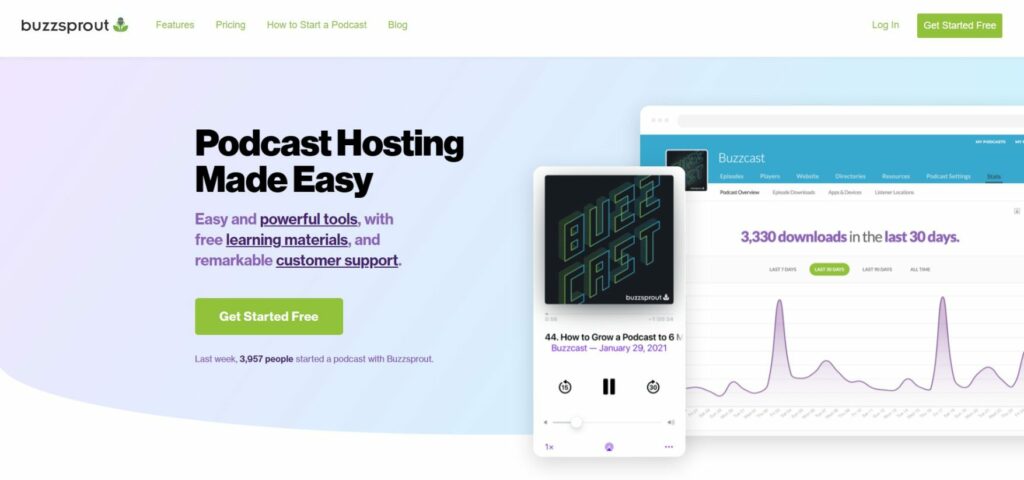
Features
1. User-friendly Interface
Buzzsprout’s platform is incredibly easy to use, even for beginners. The intuitive interface makes it simple to upload and distribute your podcast episodes to all of the major directories and platforms.
This is especially helpful for those who may not have a lot of technical expertise or experience with podcasting.
2. Detailed Analytics
Buzzsprout provides detailed analytics that allow you to track your podcast’s performance, including downloads, plays, and listener demographics.
This gives you valuable insights into your audience and helps you adjust your strategy to reach more listeners.
The analytics dashboard is user-friendly and easy to understand, with clear visualizations and charts.
3. Exceptional Customer Support
Buzzsprout’s customer support team is highly responsive and knowledgeable. They are available via email, chat, and phone, and are always willing to go the extra mile to help you out.
Whether you have a technical question or need help with your account, they are there to assist you.
In summary, Buzzsprout’s user-friendly interface, detailed analytics, and exceptional customer support make it a standout podcast hosting platform.
Whether you’re just starting out or are a seasoned pro, Buzzsprout has everything you need to take your podcast to the next level.
Pricing
Buzzsprout’s pricing plans are designed to affordable and flexible, with options for podcasters of all levels.
Here’s a breakdown of their pricing plans:
Free Plan
Buzzsprout offers a free plan that includes up to 2 hours of upload time per month.
While this plan has limited storage space and lacks some of the advanced features of the paid plans, it’s a great option for those who are just starting out and want to get a feel for the platform.
$12/month Plan
Buzzsprout’s basic plan costs $12/month and includes up to 3 hours of upload time per month, with unlimited storage space.
This plan also includes advanced statistics, the ability to create custom embed players, and the option to monetize your podcast with sponsorships.
$18/month Plan
Buzzsprout’s middle-tier plan costs $18/month and includes up to 6 hours of upload time per month, with unlimited storage space.
This plan includes all of the features of the basic plan, as well as the ability to host multiple podcasts on a single account.
$24/month Plan
Buzzsprout’s advanced plan costs $24/month and includes up to 12 hours of upload time per month, with unlimited storage space.
This plan includes all of the features of the other plans, as well as the option to schedule episode releases in advance and password-protect your podcast.
All of Buzzsprout’s plans come with a 90-day free trial, so you can test out the platform before committing to a paid plan.
And if you need more upload time or storage space, you can easily upgrade to a higher plan at any time.
Overall, Buzzsprout’s pricing is competitive and offers great value for the features and support they provide.
Buzzsprout
To launch a podcast, you’ll need a service that can host your episodes and distribute your content to podcast streaming platforms like Apple Podcasts and Spotify. This is where Buzzsrout comes into play.
2. Libsyn
As you embark on your podcasting journey, there’s one hosting platform that stands tall as the epitome of excellence – Libsyn.
Picture this: you’ve envisioned a captivating podcast, poised to leave a lasting impact on your audience. To make that vision a reality, you need a dependable and sophisticated hosting partner.
Enter Libsyn, a leader in podcast hosting services that empowers creators like you to reach a global audience with ease.
Why choose Libsyn? The answer lies in the unparalleled array of features and tools that streamline your podcasting endeavors.
From comprehensive episode distribution to analytics that reveal valuable insights, Libsyn ensures your content reaches the right ears at the right time.
With Libsyn, you’ll experience seamless integration, unmatched reliability, and a world of professional possibilities.
In the competitive landscape of podcasting, simplicity is the key to success. Libsyn understands this mantra and delivers a user-friendly interface that makes managing your episodes a breeze.
Whether you’re a seasoned podcaster or a newcomer, Libsyn’s intuitive platform simplifies the process, so you can focus on creating remarkable content.
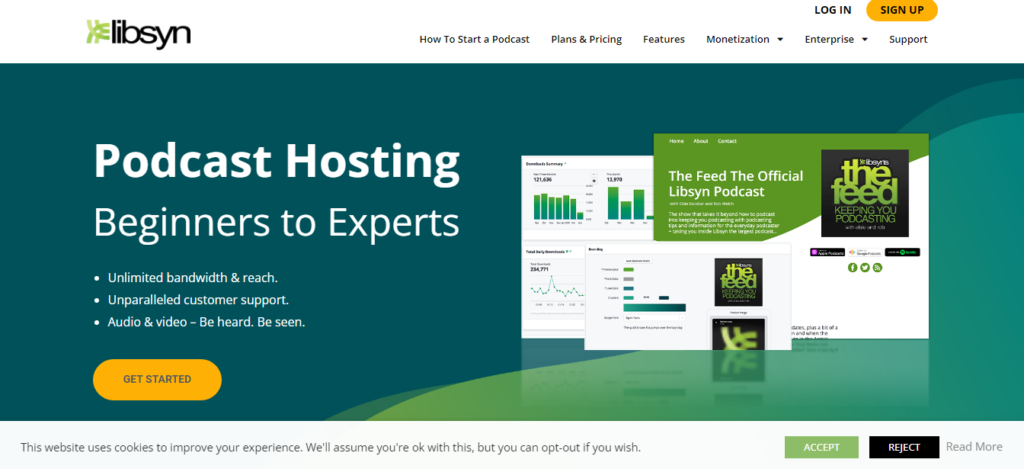
Features
Here are the three best features of Libsyn and a brief explanation of what they offer:
1. Seamless Distribution
Libsyn offers effortless episode distribution to multiple podcast directories, ensuring your content reaches a global audience with just a few clicks.
Whether it’s Apple Podcasts, Spotify, or other popular platforms, Libsyn ensures your episodes are accessible to listeners everywhere.
2. In-depth Analytics
Gain valuable insights into your audience’s behavior and engagement with Libsyn’s comprehensive analytics.
Track download trends, listener demographics, and episode performance, allowing you to make data-driven decisions to refine your content and grow your podcast effectively.
3. Exceptional Customer Support
With Libsyn, you’re never alone on your podcasting journey. Benefit from prompt and dedicated customer support from a team of experts, ready to assist you with technical issues, strategic guidance, and any questions that may arise along the way.
Pricing
Libsyn’s pricing plans:
Classic 50 Plan
$5 per month – This plan includes 50 MB of monthly storage, making it suitable for beginners or podcasters with shorter episodes. It’s an excellent option for those just starting their podcasting journey.
Advanced 250 Plan
$15 per month – With 250 MB of monthly storage, this plan is designed for content creators who produce more episodes or longer episodes. It’s a step up from the Classic plan, offering more flexibility.
Pro 500 Plan
$20 per month – The Pro 500 plan offers 500 MB of monthly storage, providing even more space for podcasters with larger audio files or multiple episodes per month.
Libsyn 5 On-publish Plans
Starting at $30 per month – These plans offer more advanced features and customizable storage options. They are suitable for professional podcasters and networks who require additional functionalities.
Custom Enterprise Plans
For high-volume producers or podcast networks, Libsyn offers custom enterprise plans with tailored features and pricing. You can contact Libsyn directly to discuss your specific needs and get a personalized quote.
Libsyn
Libsyn podcast distribution lets you publish your podcast out to the most popular podcast directories — Apple Podcasts, Google Podcasts, Spotify, and more.
3. Rss.com
This platform is a veritable Swiss Army Knife for podcasters, offering everything from customizable podcast pages to detailed analytics on your listeners’ behavior. And let’s talk about that analytics feature for a minute.
If you’re anything like me, you’re obsessed with tracking every single download and listen. RSS.com not only provides detailed metrics on your listeners’ behavior but also offers insights into how to grow your audience and monetize your podcast.
But it’s not just about the analytics. RSS.com also offers seamless integration with some of the biggest podcast directories out there.
And if you’re looking to monetize your podcast, they’ve got you covered with customizable sponsorships and ad placements.
And let’s not forget about customer service. The team at RSS.com is responsive, friendly, and always happy to help.
I’m thoroughly impressed with RSS.com, and I’m not alone. This platform has been making waves in the podcasting community for good reason.
So if you’re looking for an all-in-one RSS feed solution that’s as functional as it is user-friendly, look no further than RSS.com.
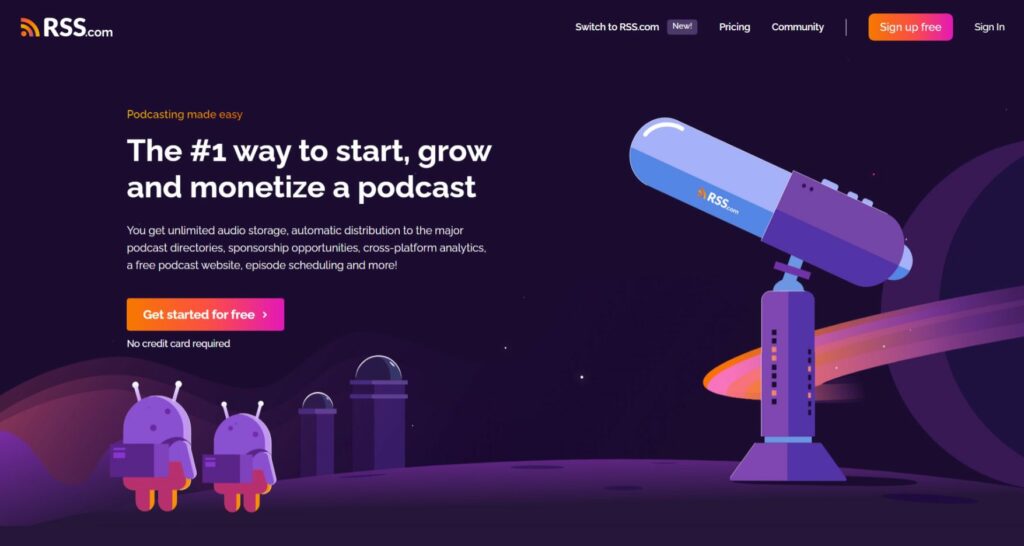
Features
1. Easy-to-use Interface
RSS.com has a user-friendly interface that makes it easy to upload your podcast. platform unlimited with a customizable podcast page.
2. Comprehensive Analytics
The platform provides detailed analytics on your listeners’ behavior, including their location, how long they listen, and which episodes are the most popular.
This information can be incredibly helpful in growing your audience and monetizing your podcast.
3. Affordable Pricing Plans
RSS.com offers a range of pricing plans to fit any budget. Whether you’re just starting out or you have an established podcast, RSS.com has a plan that will work for you.
And with no hidden fees or long-term contracts, you can rest assured that you’re getting a great value for your money.
In summary, RSS.com is a great podcast hosting platform that offers a user-friendly interface, comprehensive analytics, and affordable pricing plans.
Whether you’re just starting out or you’re a seasoned podcaster, RSS.com has everything you need to take your show to the next level.
Pricing
RSS.com’s pricing options:
All In One Podcasting Plan
Ideal for new podcasters, independent podcasters, and businesses of any size. Offers unlimited features for a price of $11.99 per month, with a 20% discount when billed annually.
Podcast Networks Plan
Designed for those who want to host multiple shows on one account. Offers 24/7 support and detailed analytics for a price of $14.99 per month, with a 25% discount when billed annually.
Enterprise Plan
Customizable plan designed for large organizations and networks. Offers advanced features, custom integrations, and dedicated support.
Pricing varies based on individual needs, contact RSS.com for more information.
RSS.com offers affordable pricing plans to fit any budget, whether you’re just starting out or you’re a large organization.
With unlimited features, detailed analytics, and customizable options, RSS.com has everything you to take your podcast to the next level.
RSS.com
RSS.com is a SaaS platform to start, grow and monetize a podcast with a global community of content creators, as well as strategic investments in audio
4. Spreaker
Are you looking for a new platform to host your show? Well, hold onto your headphones because we’ve got the scoop on why Spreaker is the bee’s knees.
First things first, Spreaker’s user interface is about as clean and sleek as it gets. It’s like the platform was designed by a minimalist guru who knows exactly what podcasters want and need.
You’ll be able to upload your episodes lickety-split and customize your show’s page without breaking a sweat.
Spreaker’s analytics are top-notch. You’ll be able to see exactly how many downloads each episode gets, where your listeners are tuning in from, and even how long they’re sticking around for.
It’s like having a private investigator on retainer, but without all the sketchy shenanigans.
And let’s not forget about Spreaker’s monetization options. They make it easy to earn some dough by sponsoring your show or selling ad space.
Think of it as a way to turn your passion project into a profitable business.
But our favorite part of Spreaker? The community. It’s like a podcasting utopia where creators can connect, collaborate, and support each other.
It’s like the Cheers of podcast platforms, where everybody knows your name (or your show’s name, at least).
So there you have it, folks. Spreaker is the real deal. It’s like the avocado toast of podcast platforms—trendy, delicious, and totally worth the investment.
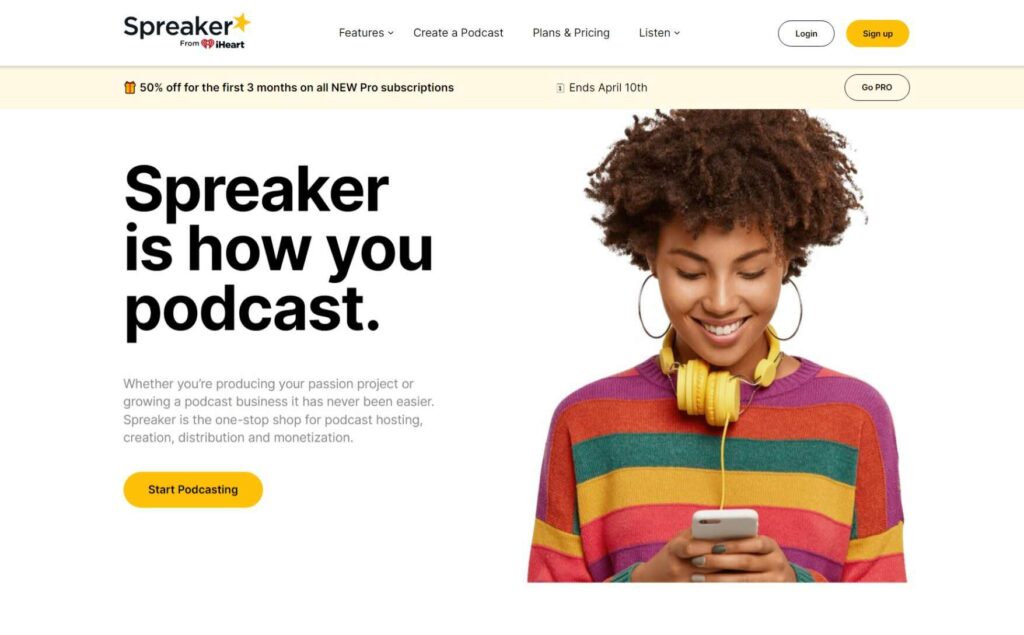
Features
Here are the three best features of Spreaker and a brief explanation of what they offer:
1. User-friendly Interface
Spreaker’s platform is designed with simplicity in mind. It’s easy to navigate and upload your episodes, and customizing your show’s page is a breeze.
This feature is especially useful for podcasters who are new to the game or who may not have a lot of technical experience.
2. Advanced Analytics
Spreaker’s analytics are top-notch, providing podcasters with detailed insights into their audience’s listening habits.
You’ll be able to see exactly how many downloads each episode gets, where your listeners are tuning in from, and even how long they’re sticking around.
Information is invaluable when it comes to tailoring your content to your audience and growing your show.
3. Monetization Options
Spreaker makes it easy to earn money with your podcast by offering a variety of monetization options.
You can sell ad space on your show, use Spreaker’s built-in sponsorship tool to connect with advertisers, or even offer premium content to your listeners.
This feature is particularly useful for podcasters who are looking to turn their passion into a profitable business.
Overall, Spreaker’s user-friendly interface, advanced analytics, and monetization options make it one of the top podcast platforms available today.
Whether you’re just starting out or you’re a seasoned podcaster, Spreaker has the tools and features you need to take your show to the next level.
Pricing
Spreaker’s pricing plans:
Free Speech
Free of charge, includes unlimited listeners, episode scheduling, embedded players, and basic statistics.
On-air Talent
Costs $8/month, includes advanced statistics, auto-upload to iHeartRadio, Spotify, and Apple Podcasts, customizable RSS feeds, and the ability to make money with ads.
Broadcaster
Costs $20/month, includes full statistics, auto-upload to iHeartRadio, Spotify, and Apple Podcasts, customizable RSS feeds, and 12 months of statistics.
Anchorman
Costs $50/month, includes all the features of the Broadcaster plan, as well as enhanced private podcasts and in-app support.
Publisher
Includes all the features of the Anchorman plan, as well as additional features such as custom branding, a dedicated account manager, and white-label solutions for hosting and publishing podcasts.
Spreaker
Spreaker is a web-based podcast hosting software designed to help businesses create, distribute, and monetize podcasts. The built-in content management system (CMS) lets teams publish podcast episodes, which can be distributed across various platforms such as Apple Podcasts, Google Podcasts, Spotify, and more.
5. Transistor
From its sleek and intuitive interface to its robust analytics features, Transistor has everything a podcaster could need to take their show to the next level.
One of the standout features of Transistor is its customizable podcast pages. With a wide range of themes and branding options available, you can create a page that perfectly represents your show’s unique style and voice.
And if you’re looking to monetize your podcast, Transistor makes it easy with built-in sponsorships and ad placements.
But it’s not just about the aesthetics. Transistor also offers detailed analytics on your listeners’ behavior, including data on downloads, listens, and subscriptions.
And if you’re looking to grow your audience, Transistor provides insights into optimizing your show for maximum reach.
I’m thoroughly impressed with Transistor, and I’m not alone. This platform has been getting rave reviews from podcasters all over the world, and it’s easy to see why.
So if you’re looking for a podcast hosting platform that’s as functional as it is user-friendly, look no further than Transistor.
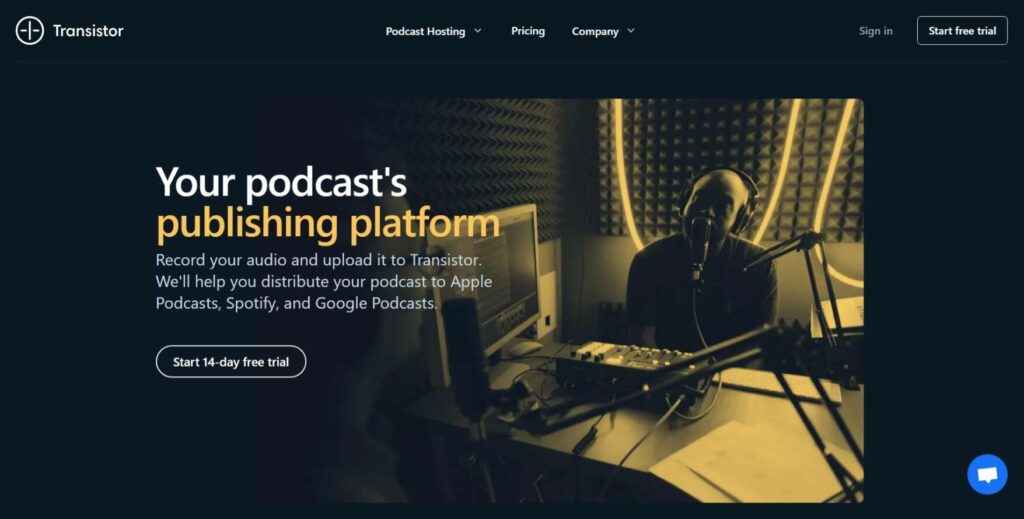
Features
1. Easy Podcast Hosting And Distribution
Transistor makes it easy to host your podcast and distribute it to all major platforms, including Apple Podcasts, Spotify, and Google Podcasts.
With a simple setup process and intuitive dashboard, you can get your podcast up and running in no time.
2. Advanced Analytics And Tracking
Transistor offers detailed analytics and tracking features that allow you to see how your podcast is performing.
You can track downloads, subscribers, and listener demographics, as well as see which episodes are most popular.
This data can help you make informed decisions about your podcast and tailor your content to your audience.
3. Customizable Podcast Website
With Transistor, you can create a customizable podcast website that matches your brand and style.
You can choose from a variety of templates and customizations, including adding your own domain name and branding.
This allows you to create a professional-looking website that showcases your podcast and engages your audience.
Transistor offers a range of features that make it easy to host and distribute your podcast, as well as track performance and engage your audience.
With an intuitive dashboard, detailed analytics, and customizable website options, Transistor is a great choice for anyone looking to start or grow their podcast.
Pricing
Pricing information for Transistor:
Hobbyist Plan
Ideal for new podcasters or those just starting out. This plan allows for 2 team members and up downloads per month with a cost $19 per.
Professional Plan
Designed for mid-sized podcasts and businesses. This plan allows for 5 team members and up to 50,000 downloads per month, with a cost of $49 per month.
Business Plan
Customizable plan designed for large organizations and networks. This plan allows for unlimited team members and downloads, as well as advanced analytics and integrations. Pricing varies based on individual needs, contact Transistor for more information.
Free Trial Available
Transistor offers a free 14-day trial for all plans, allowing you to test out the platform and see if it’s right for you before committing to a paid plan.
In summary, Transistor offers a range of pricing plans to fit the needs of any podcast, whether you’re just starting out or you’re a large organization.
With a flexible pricing structure, detailed analytics, and customizable options, Transistor is a great choice for anyone looking to start or grow their podcast.
Transistor
Transistor is a cloud-based podcast publishing solution, which helps users record, upload and distribute audio to Apple Podcast, Pocket Casts, Spotify, Google Podcast and various other platforms.
6. Podbean
Podbean is a podcast hosting platform that has been around for over a decade, and it’s clear that they’ve been refining their product over the years. The platform offers a range of features that make it an attractive option for podcasters of all levels.
One of the standout features of Podbean is its ease of use. The platform offers a simple and intuitive interface that makes it easy to upload and manage your podcast episodes.
Additionally, Podbean offers a range of customizable themes and branding options to help you create a personalized podcast page that your show’s unique identity.
Another great feature of Podbean is its comprehensive analytics. The platform provides detailed data on your listeners’ behavior, including their location, how long they listen, and which episodes are the most popular.
This information can be incredibly helpful in growing your audience and monetizing your podcast.
Speaking of monetization, Podbean offers a range of options for generating revenue from your podcast.
From sponsorships and ad placements to premium content and merchandise sales, Podbean provides a variety of ways for podcasters to turn their passion into a profitable business.
And let’s not forget about customer service. Podbean has a dedicated support team that is available 24/7 to help with any issues or questions that may arise.
Podbean is a solid choice for podcasters looking for a reliable and user-friendly hosting platform.
With its comprehensive analytics, monetization options, and responsive customer service, Podbean has everything you need to take your podcast to the next level.
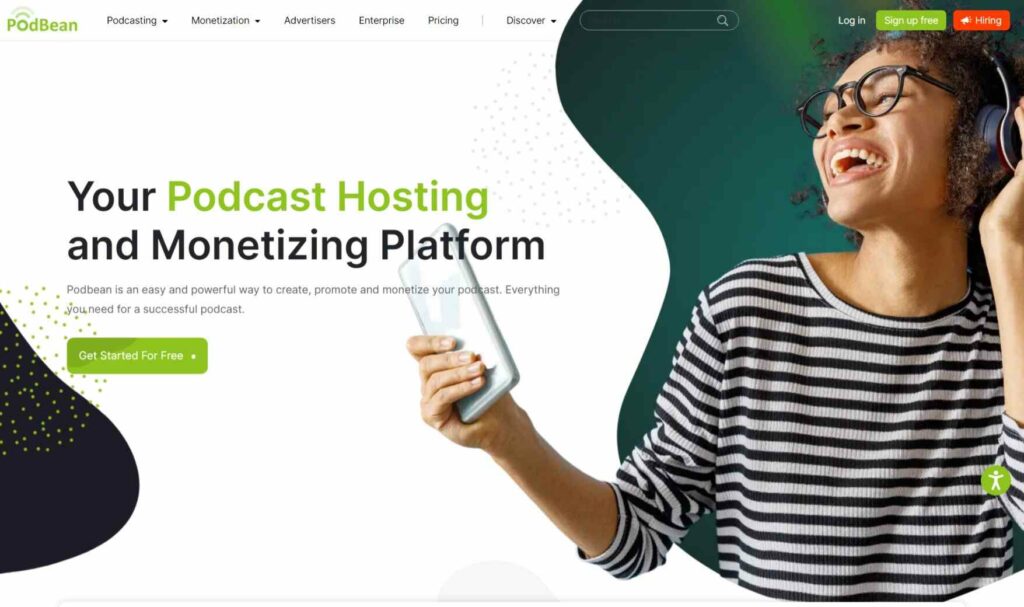
Features
Here are 3 key features of Podbean:
1. Comprehensive Podcast Hosting And Distribution
Podbean provides comprehensive hosting and distribution services, allowing you to easily upload and distribute your podcast to all major platforms, including Apple Podcasts, Spotify, and Google Podcasts.
They also offer unlimited storage and bandwidth, so you don’t have to worry about running out of space or exceeding bandwidth limits.
2. Monetization Options
Podbean offers multiple monetization options for podcasters, including advertising, sponsorships, premium content, and listener support.
They also provide detailed analytics and tracking, allowing you to see how your monetization efforts are performing and make informed decisions about your strategy.
3. Customizable Podcast Website
With Podbean, you can create a customizable podcast website that matches your brand and style.
You can choose from a variety of templates and customizations, including adding your own domain name and branding.
This allows you to create a professional-looking website that showcases your podcast and engages your audience.
Podbean offers a range of features that make it easy to host and distribute your podcast, as well as monetize your content and engage your audience.
With unlimited storage and bandwidth, detailed analytics, and customizable website options, Podbean is a great choice for anyone looking to start or grow their podcast.
Pricing
PodBean pricing options:
Basic Plan
The free plan allows you to host up to 5 hours of audio and includes basic analytics, custom branding, and distribution to all major platforms.
However, it does include Podbean branding on your podcast page.
Unlimited Audio Plan
With the Unlimited Audio plan, you can upload and host unlimited audio, as well as access advanced analytics, custom branding, and distribution to all major platforms.
This plan starts at $9/month for audio storage only and $29/month for audio and video storage.
Unlimited Plus
Designed for professional podcasters and businesses, this plan includes all the features of the Unlimited Audio plan, as well as advanced monetization options, including advertising, sponsorships, and listener support.
It also includes a customizable podcast website with a custom domain name. This plan starts at $99/month.
Network
Customizable plan designed for large organizations and networks. This plan includes all the features of the Business plan, as well as priority support and advanced analytics.
Pricing varies based on individual needs, contact Podbean for more information.
Free Trial
Podbean offers a free 14-day trial for all plans, allowing you to test out the platform and see if it’s right for you before committing to a paid plan.
Podbean offers a range of pricing plans to fit the needs of any podcaster, whether you’re just starting out or you’re a large organization.
With a flexible pricing structure, advanced analytics, and customizable options, Podbean is a great choice for anyone looking to start or grow their podcast.
Podbean
Podbean offers a free podcast hosting service. You can use Podbean Podcast App to live stream, record and publish a podcast for free. Podbean also provides paid plans which provide advanced features and more storage space.
7. Simplecast
Simplecast is a podcast hosting platform that has been gaining popularity in recent years, and for good reason.
With its sleek and intuitive interface, robust analytics, and comprehensive marketing tools, Simplecast has everything a podcaster needs to create and grow their show.
One of the standout features of Simplecast is its user-friendly interface. The platform is designed with podcasters in mind, making it easy to upload and manage your episodes, customize your podcast page, and monetize your show.
Speaking of monetization, Simplecast offers a range of options for generating revenue from your podcast, including sponsorships, ad placements, and premium content.
The platform also provides detailed analytics on your listeners’ behavior, allowing you to optimize your show for maximum reach and revenue.
But Simplecast isn’t just about the numbers. The platform also offers a range of marketing tools to help you grow your audience and promote your show.
From social media integrations to email marketing campaigns, Simplecast makes it easy to get your podcast in front of the right people.
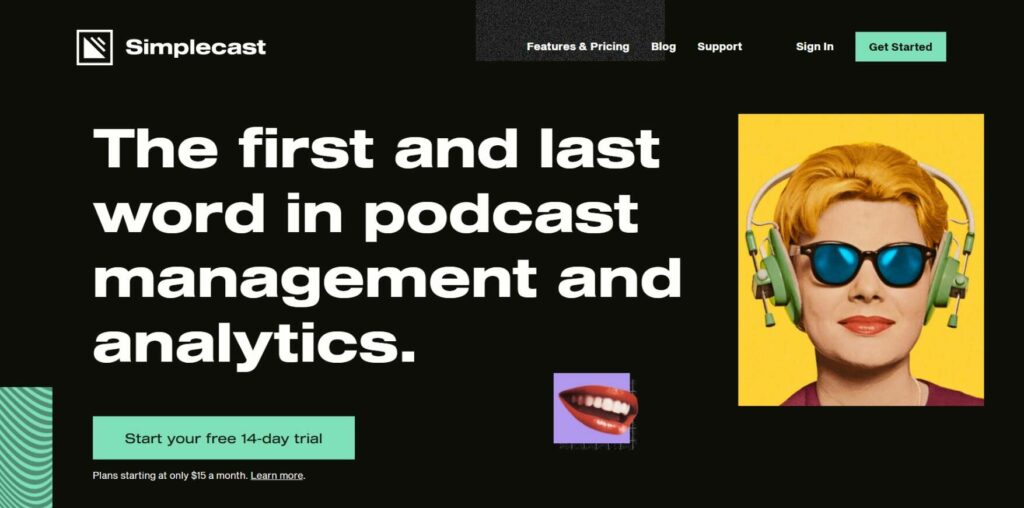
Features
Below are three key features of Simplecast:
1. Advanced Analytics
Simplecast provides advanced analytics that give you detailed insights into your podcast’s performance.
You can track downloads, subscribers, and engagement metrics, as well as monitor social media activity and referral sources.
This allows you to make data-driven decisions about your content strategy and monetization efforts.
2. Customizable Podcast Website
With Simplecast, you can easily create a customizable podcast website that matches your brand and style.
You can choose from a variety of templates and customizations, including adding your own domain name and branding.
This allows you to create a professional-looking website that showcases your podcast and engages your audience.
3. Monetization Options
Simplecast offers multiple monetization options for podcasters, including advertising, sponsorships, and listener support.
They also provide detailed analytics and tracking, allowing you to see how your monetization efforts are performing and make informed decisions about your strategy.
Simplecast offers a range of features that make it easy to host and distribute your podcast, as well as monetize your content and engage your audience.
With advanced analytics, customizable website options, and multiple monetization options, Simplecast is a great choice for anyone looking to start or grow their podcast.
Pricing
Basic Plan
The Basic plan costs $15/month and includes unlimited storage and bandwidth, as well as basic analytics and a customizable podcast website.
This plan is suitable for podcasters who are just starting out or have a small audience.
Essential Plan
The Essential plan costs $35/month and includes all the features of the Basic plan, as well as advanced analytics, monetization options, and a branded podcast website.
This plan is suitable for podcasters who want more advanced analytics and monetization options.
Growth Plan
The Growth plan costs $85/month and includes all the features of the Essential plan, as well as priority support, advanced integrations, and custom branding options.
This plan is suitable for podcasters who have a large audience and want to take their podcast to the next level.
Enterprise Plan
The Enterprise plan is a custom pricing plan designed for large organizations and networks.
It includes all the features of the Growth plan, as well as a dedicated account manager, custom integrations, and advanced security features.
This plan is suitable for organizations that need a high level of support and customization.
Free Trial
Simplecast offers a free 14-day trial for all plans, allowing you to test out the platform and see if it’s right for you before committing to a paid plan.
In summary, Simplecast offers a range of pricing plans to fit the needs of any podcaster, whether you’re just starting out or you’re a large organization.
With flexible pricing options, advanced analytics, and customization options, Simplecast is a great choice for anyone looking to start or grow their podcast.
Simplecast
Simplecast is a podcast hosting software designed to help independent artists, networks and businesses analyze, distribute and publish audio content across multiple platforms such as Apple Podcasts, Spotify, Stitcher, and more. Administrators can invite team members to collaborate on podcast shows.
8. Captivate
First off, the interface is sleek and intuitive, making it easy to navigate and customize your podcast page.
And speaking of customization, Captivate offers a range of gorgeous themes that will make your podcast page look like it was designed by a pro (even if you’re a total amateur like me).
But what really sets Captivate apart is its podcast analytics. I mean, if you’re anything like me, you’re obsessed with tracking every single download and listen.
Captivate not only provides detailed metrics on your listeners’ behavior but also offers insights into how to grow your audience and monetize your podcast.
And the icing on the cake? Captivate’s customer service is top-notch, with a responsive and friendly team that’s always happy to help.
Overall, I’m thoroughly impressed with Captivate, and I’m not alone. This platform has been making waves in the podcasting community and for good reason.
So if you’re looking for a hosting platform that’s as sleek and sophisticated as it is functional, look no further.
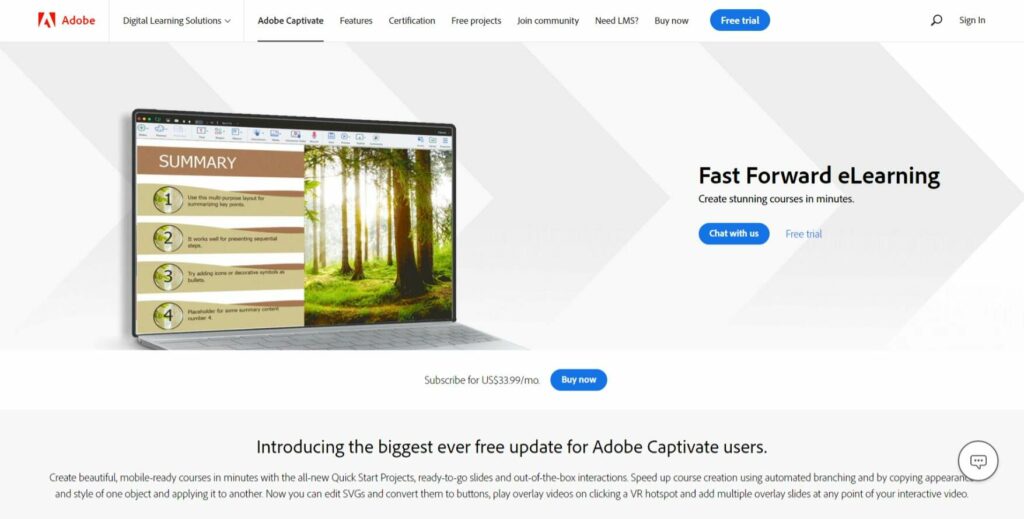
Features
Below are three key features of Captivate:
1. Advanced Analytics
Captivate provides advanced analytics that gives you detailed insights into your podcast’s performance.
You can track downloads, subscribers, and engagement metrics, as well as monitor social media activity and referral sources.
This allows you to make data-driven decisions about your content strategy and monetization efforts.
2. Smart Distribution
Captivate offers smart distribution options that make it easy to distribute your podcast to all major listening platforms, including Apple Podcasts, Spotify, and Google Podcasts.
This ensures that your podcast reaches the widest possible audience and helps you grow your listenership.
3. Monetization Options
Captivate offers multiple monetization options for podcasters, including advertising, sponsorships, and listener support.
They also provide detailed analytics and tracking, allowing you to see how your monetization efforts are performing and make decisions strategically.
Pricing
Podcaster Plan
The Podcaster plan costs $19/month and includes unlimited storage and bandwidth, analytics, smart distribution, and monetization options.
This plan is suitable for podcasters who are just starting out and want a reliable hosting platform that can help them grow their audience and monetize their content.
Audio Influencer Plan
The Audio Influencer plan costs $49/month and includes all the features of the Podcaster plan, as well as advanced analytics, customizable branding options, and team access.
This plan is suitable for podcasters who have a larger audience and want to take their podcast to the next level.
Podcaster Plus Plan
The Podcaster Plus plan costs $99/month and includes all the features of the Audio Influencer plan, as well as additional support and training resources.
This plan is suitable for podcasters who want more personalized support and guidance to help them grow their podcast and monetize their content.
Network Plan
The Network plan a custom pricing plan designed for podcast networks and organizations. It includes all the features of the Podcaster Plus plan, as well as custom branding options, team management tools, and dedicated support.
This plan is suitable for podcast networks and organizations that need a high level of support and customization.
Free Trial
Captivate offers a free 7-day trial for all plans, allowing you to test out the platform and see if it’s right for you before committing to a paid plan.
Captivate offers a range of pricing plans to fit the needs of any podcaster, whether you’re just starting out or you’re part of a larger organization.
With flexible pricing options, advanced analytics, smart distribution, and multiple monetization options, Captivate is a great choice for anyone looking to start or grow their podcast.
Adobe Captivate Prime
Adobe Captivate Prime is a next-gen Learning Management System (LMS) that delivers personalized learning experiences across multiple devices.
What Is The Best Free Podcast Hosting Product?
With the rise of podcasting, there has been an increase in the number of podcast hosting services available.
While some services charge a premium, others offer free plans. But which one is the best free podcast hosting product?
We’ll explore the features and benefits of several free podcast hosting products to help you determine which one is the best for your needs.
1. Buzzsprout
As we covered earlier, Buzzsprout is an excellent podcast hosting service that offers reliable hosting, a user-friendly interface, and comprehensive analytics.
With its unlimited storage and bandwidth, top-notch customer support, and free plan, Buzzsprout is a great option for podcasters of all levels of experience.

2. Libsyn
Libsyn is a popular podcast hosting service that has been around since 2004. It is known for its reliable hosting, robust analytics, and advanced features.
As someone who has used Libsyn for several years, I can confidently say that it is a top-notch podcast hosting service.
One of the things I love about Libsyn is its reliability. The platform has a proven track record of uptime, which is essential for podcasters who want to ensure that their episodes are always available to their listeners.
Libsyn’s analytics are another standout feature. The platform provides comprehensive data on your podcast’s performance, including downloads, subscribers, and listener demographics.
This information is useful for understanding your audience and making informed decisions about your podcast’s direction.
In terms of features, Libsyn offers a wide range of advanced options, including customizable RSS feeds, episode scheduling, and automatic social media sharing.
These features are particularly useful for podcasters who want to streamline their workflow and save time.
Lastly, Libsyn has excellent customer support. The team is responsive and helpful, and they offer a wealth of resources and guides to help podcasters get the most out of the platform.

3. Soundcloud
SoundCloud is a popular platform for music creators and podcasters alike. The platform has a vast library of content, making it easy to discover new artists and podcasts.
While SoundCloud is not designed specifically for podcast hosting, it does offer some features that make it a viable option for podcasters.
One of the most significant advantages of SoundCloud is its community. The platform has a large and active user base, which makes it easy to connect with creators and grow your audience.
Another benefit of SoundCloud is its ease of use. The platform’s interface is intuitive and straightforward, making it easy to upload and share your content.
Additionally, SoundCloud offers some basic analytics that allows you to track your plays, likes, and reposts, giving you a sense of how your content is performing.
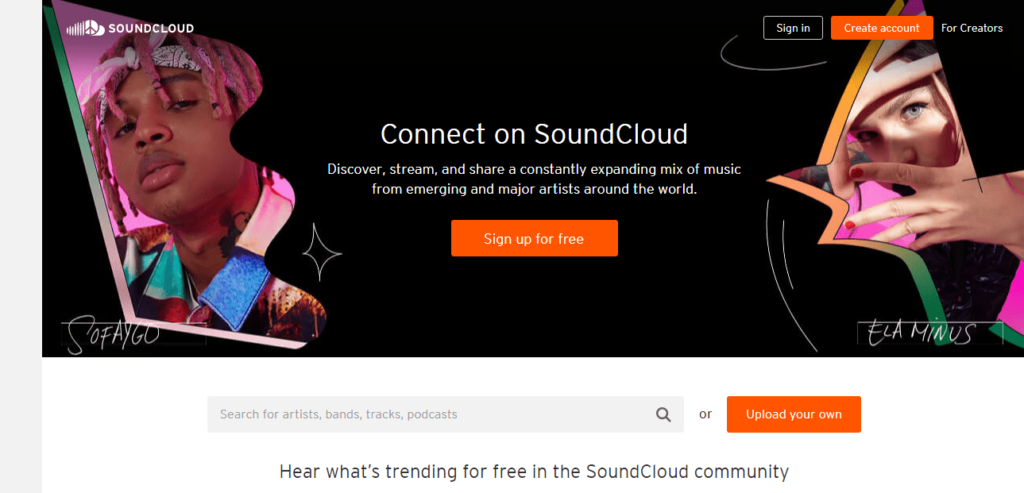
4. Podomatic
Podomatic is a podcast hosting platform that has been around since 2005. The platform offers a range of features designed specifically for podcasters, making it a popular choice among creators.
As someone who has used Podomatic for several years, I can confidently say that it is a feature-rich podcast hosting service.
One of the Podomatic is its ease of use. The platform’s interface is straightforward and intuitive, making it easy to upload and manage your content.
Another benefit of Podomatic is its advanced analytics. The platform provides detailed information on your listeners, including their demographics, listening habits, and engagement levels.
This information is crucial for understanding your audience and making informed decisions about your podcast’s direction.
Overall, I would recommend Podomatic to podcasters who are looking for a reliable and feature-rich hosting platform.
With its advanced analytics, customizable themes, and advanced features, Podomatic is an excellent choice for podcasters of all levels of experience.
However, its pricing may be a significant consideration for some podcasters, particularly those on a tight budget.
5. Blubrry
Blubrry is a podcast hosting and distribution platform that has been around since 2005. The platform offers a range of features designed specifically for podcasters, making it a popular choice among creators.
As someone who has used Blubrry for several years, I can confidently say that it is one of the best podcast hosting services available.
One of the most significant advantages of Blubrry is its advanced analytics. The platform provides detailed information on your listeners, including their demographics, listening habits, and engagement levels.
This information is crucial for understanding your audience and making informed decisions about your podcast’s direction.
Another benefit of Blubrry is its range of advanced features. The platform offers a range of tools for podcasters, including custom RSS feeds, automatic episode publishing to social media, and a WordPress plugin for easy integration with your website.
With its advanced analytics, unlimited storage and bandwidth, and range of advanced features, Blubrry is an excellent choice for podcasters of all levels of experience.
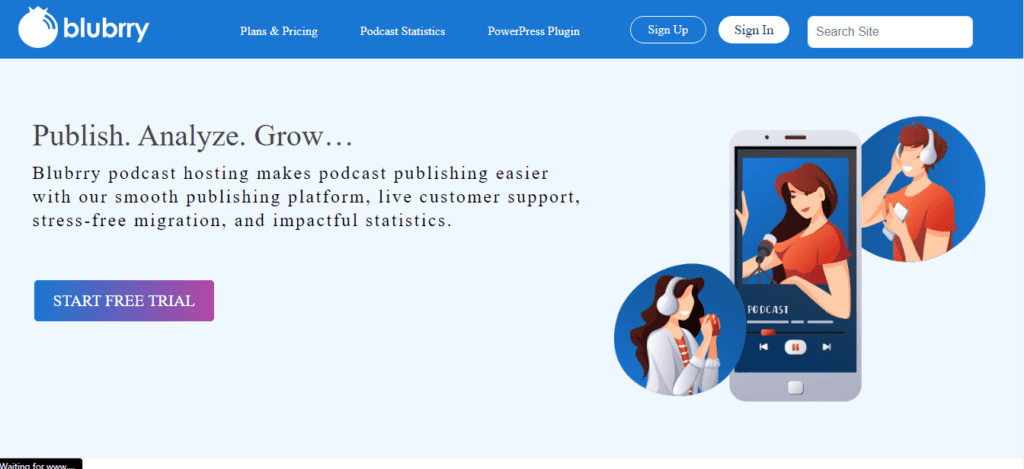
What Is Podcast Hosting?
So we’ve covered the top podcast hosting sites, but was exactly is podcast hosting?
Podcast hosting is a service that allows podcasters to upload, store, and distribute their audio files on the internet.
A podcast hosting provider takes care of the technical aspects of hosting and distributing podcasts, so podcasters can focus on creating content.
When a podcaster uploads an episode to a hosting platform, the platform generates an RSS feed.
This feed is a special file that contains information about the podcast and its episodes, such as the title, description, and audio file.
The RSS feed enables listeners to subscribe to the podcast and receive new episodes automatically when they are released.
Podcast hosting platforms typically offer additional features, such as analytics, website integration, and social media sharing.
Analytics can provide podcasters with insights into their audience, such as the number of downloads, geographical location, and listening habits.
Website integration allows podcasters to embed their episodes onto their own website or blog.
Social media sharing provides an easy way for podcasters to promote their episodes on social media platforms.
Podcast hosting providers charge a fee for their services, usually based on the amount of storage and bandwidth used.
Some platforms offer a free plan with limited storage and features, while others offer more advanced plans with higher storage limits and additional features.
Podcast hosting is an essential service for podcasters who want to reach a wider audience and build a following.
Without a hosting platform, it would be challenging for podcasters to distribute their content effectively, and they would miss out on the analytic and promotional benefits of podcast hosting.
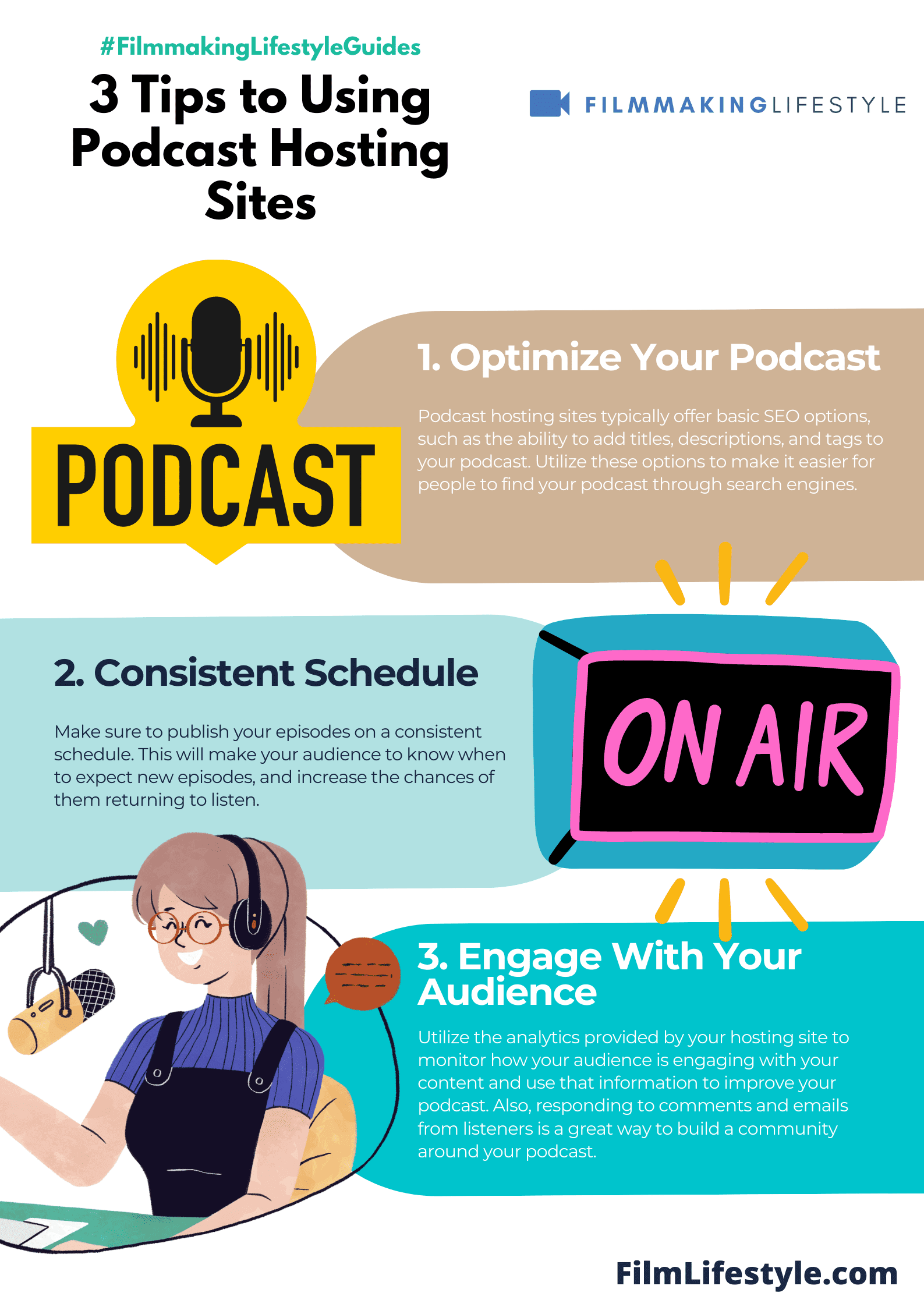
What Are Podcast Directories?
Podcast directories are apps or websites that collect podcast RSS feeds and sort them by category.
These directories also double as podcast players and podcast search engines. They are the platforms where podcast listeners search for, subscribe to, and listen to podcasts.
Popular podcast directories include:
- Apple Podcasts,
- Spotify, and
- Google Podcast.
- Other directories include Audi, Learn Out Loud, Listen Notes, and Miro.
Podcast directories are similar to YouTube or Netflix for audio, as they provide a platform for listeners to consume podcast episodes.
How Much Do Podcast Hosts Make?
According to Wired Clip, a podcaster with around 10,000 downloads per episode can expect to earn between $500 to $900.
Very successful podcasts can earn much more, reaching up to $30 million in annual income.
Forbes Advisor states that popular podcasts will draw the attention of advertisers that will pay you to plug their products into ads that air during your show.
NerdWallet suggests that sponsorships are one way people make money on their podcasts.
Salary.com reports that the salary range for a Podcast Host job is from $25,119 to $33,709 per year in the United States.
ZipRecruiter states that the majority of Podcast Host salaries currently range between $35,000 (25th percentile) to $130,000 (75th percentile) with top earners (90th percentile) making $156,000 annually across the United States.
Overall, podcast hosts can make anywhere from $25,119 to $156,000 per year, depending on the success of their podcast.
How Do I Host A Podcast?
Hosting a podcast involves several steps, from planning and recording to editing and publishing. Here’s a brief overview of the steps involved in hosting a podcast:
1. Choose A Topic And Format
Decide on the topic you want to cover and the format you want to use. Will it be an interview show or a solo show? Will you have guests, and how often will you release new episodes?
2. Choose Your Equipment
You’ll need a microphone, headphones, and a computer or other recording device. You also need software to record and edit your podcast, such as Audacity, GarageBand, or Hindenburg Journalist.
3. Record Your Podcast
Set up your equipment and start recording. You can record in a studio, at home, or even on your phone. Make sure to test your equipment and check your audio levels before recording.
4. Edit Your Podcast
Edit your podcast to remove any mistakes, add music, and create a professional-sounding show. You can use editing software to cut and splice audio tracks, add music and sound effects, and adjust volume levels.
5. Choose A Hosting Platform
There are several podcast hosting platforms available, such as Buzzsprout, Libsyn, and Podbean. Choose a platform that fits your needs and budget.
6. Publish Your Podcast
Once you’ve edited your podcast and uploaded it to your hosting platform, you can publish your podcast on directories like Apple Podcasts, Spotify, and Google Podcasts.
7. Promote Your Podcast
Share your podcast on social media, email newsletters, and other channels to promote it and grow your audience.
These are the basic steps to host a podcast. However, keep in mind that there are many other factors to consider, such as marketing, branding, and monetization.
How To Publish A Podcast On Various Platforms
Once you have recorded and edited your episode, you need to publish it on various platforms to reach your audience. Here’s how to publish a podcast on various platforms:
1. Apple Podcasts
Apple Podcasts is the largest podcast directory and a must-have platform for any podcaster.
To submit your podcast to Apple Podcasts, create an Apple ID and go to Podcasts Connect. Enter your podcast’s RSS feed and wait for approval.
2. Spotify
Spotify is another popular platform to publish your podcast.
To submit your podcast to Spotify, go to Spotify for Podcasters and create an account. Submit your podcast’s RSS feed, and you’ll receive an email when your podcast is approved.
3. Google Podcasts
Google Podcasts is a fast-growing platform that’s easy to submit your podcast to.
Submit your podcast’s RSS feed to Google Podcasts Manager, and your podcast will be available on Google Podcasts.
4. Stitcher
Stitcher is a popular platform that offers personalized recommendations for listeners.
To submit your podcast to Stitcher, create an account and submit your podcast’s RSS feed.
5. Tunein
TuneIn is a platform that offers live radio streaming, music, and podcasts.
To submit your podcast to TuneIn, create a TuneIn account and submit your podcast’s RSS feed.
6. Iheartradio
iHeartRadio is a platform that offers live radio streaming, music, and podcasts.
To submit your podcast to iHeartRadio, create an iHeartRadio account and submit your podcast’s RSS feed.
7. Podbean
Podbean is a podcast hosting platform that also offers distribution to major podcast directories.
To submit your podcast to Podbean, create a Podbean account and upload your podcast episode.
8. Overcast
Overcast is a popular podcast player for iOS devices.
To submit your podcast to Overcast, you need to have your podcast listed on Apple Podcasts.
9. Pocket Casts
Pocket Casts is a popular podcast player for iOS and Android devices.
To submit your podcast to Pocket Casts, submit your podcast’s RSS feed to the Pocket Casts directory.
10. Other Platforms
There are many other podcast directories and platforms to submit your podcast to, such as Deezer, Castbox, Player FM, and more.
Check each platform’s submission guidelines and submit your podcast’s RSS feed.
By following these steps, you can publish your podcast on various platforms and reach a wider audience.
Make sure to promote your podcast on social media and other channels to grow your audience.
What Is The Best Podcast Equipment I Need For My Show?
The best podcast equipment for your show depends on your budget and the type of sound you want to achieve.
For beginners, a USB microphone like the Blue Yeti is a great option. It’s a great value for the money and produces good sound quality.
You may also want to consider investing in a digital recorder or a computer to record your podcast.
Let’s take a look!
1. Blue Yeti: Best Podcast Microphone
This USB microphone is the go-to choice for many podcasters, thanks to its excellent sound quality and ease of use.
One of the best things about the Blue Yeti is its versatility. It features four different directional settings, which means you can record sound from a variety of sources with ease.
Whether you’re recording alone or with a group, the Blue Yeti can adjust to your needs.
Plus, the microphone also has a built-in headphone jack for zero-latency monitoring, so you can hear yourself in real-time while recording.
Another great feature of the Blue Yeti is its simple setup. Since it’s a USB microphone, all you need to do is plug it into your computer or laptop and you’re ready to go.
It’s compatible with both Mac and PC, and most recording software, including popular options like GarageBand and Audacity.
So whether you’re just starting out or you’re a seasoned podcaster, the Blue Yeti is an excellent choice for achieving high-quality sound.
- Custom Three-Capsule Array: Produces Clear, Powerful, Broadcast-Quality Sound For Youtube, Game...
- Blue Voice Software: Craft The Perfect Broadcast Vocal Sound And Entertain Your Audience With...
- Four Pickup Patterns: Flexible Cardioid, Omni, Bidirectional, And Stereo Pickup Patterns Allow You...
- Onboard Audio Controls: Headphone Volume, Pattern Selection, Instant Mute, And Mic Gain Put You In...
- Positionable design: Pivot the mic in relation to the sound source to optimize your sound quality...
2. Macbook Air: Best Laptop For Podcasting
This lightweight and powerful laptop is the perfect podcasters on-the-go.
One of the best things about the MacBook Air is its long battery life. You can record and edit your podcast for hours without having to worry about running out of juice.
Plus, the laptop is equipped with a powerful processor, which means you can easily run multiple apps and programs at once without any lag or slowdown.
Another great feature of the MacBook Air is its high-quality display. The laptop features a Retina display, which means you’ll be able to see every detail of your editing work with crystal-clear clarity.
This is especially important for podcasters who need to edit audio files and create graphics for their podcast artwork.
The MacBook Air is an excellent choice for podcasters who need a reliable and powerful laptop. Its long battery life, powerful processor, and high-quality display make it the perfect choice for recording, editing, and uploading your podcast episodes with ease.
- STRIKINGLY THIN DESIGN — The redesigned MacBook Air is more portable than ever and weighs just 2.7...
- SUPERCHARGED BY M2 — Get more done faster with a next-generation 8-core CPU, up to 10-core GPU and...
- UP TO 18 HOURS OF BATTERY LIFE — Go all day and into the night, thanks to the power-efficient...
- BIG, BEAUTIFUL DISPLAY — The 13.6-inch Liquid Retina display features over 500 nits of brightness,...
- ADVANCED CAMERA AND AUDIO — Look sharp and sound great with a 1080p FaceTime HD camera, three-mic...
3. Logitech C920S: Best Webcam For Podcasting
This powerful camera is the perfect tool for streamers who want to deliver crystal-clear video to their audience.
One of the best things about the C920S is its high-definition video capabilities. With 1080p resolution, you’ll be able to stream your content in stunning detail.
Another great feature of the C920S is its built-in microphone. This powerful mic can capture your voice with incredible clarity, making it the perfect tool for streamers who want to communicate with their audience in real-time.
The Logitech C920S is an excellent choice for streamers who want to take their content to the next level.
With high-definition video, powerful autofocus technology, and a built-in microphone, this camera has everything you need to deliver professional-quality streams to your audience.
- Bundle Includes: Logitech C920S Pro HD Webcam and 4-Port 3.0 USB Hub
- Full HD 1080P: Chat and record vibrant, true-to-life video. The glass lens and full HD 1080p at...
- Content Creation with Capture: With Logitech Capture, you can start recording high-quality video...
- Chat In Full Stereo: Two integrated mics capture audio from every angle, so your voice always sounds...
- Smooth Operation: Easily connects to your PC's USB 2.0 port with 5-feet cable
4. Audio-technica Ath-m50x: Best Headphones For Podcasting
Are you a podcaster looking for a high-quality set of headphones to help take your audio game to the next level?
Look no further than the Audio-Technica ATH-M50x. These headphones are the perfect tool for podcasters who need to hear every detail of their recording.
One of the best things about the ATH-M50x is its exceptional sound quality. With 45mm drivers and a frequency range of 15Hz to 28kHz these headphones deliver clear, accurate sound that will help you pick up on every nuance of your recording.
Another great feature of the ATH-M50x is its comfort. These headphones feature soft, cushioned earpads that will keep you comfortable even during long recording sessions.
With exceptional sound quality, a closed-back design, and comfortable earpads, these headphones have everything you need to take your podcasting game to the next level.
- Critically acclaimed sonic performance praised by top audio engineers and pro audio reviewers
- Proprietary 45 millimeter large aperture drivers with rare earth magnets and copper clad aluminum...
- Exceptional clarity throughout an extended frequency range with deep accurate bass response
- Circumaural design contours around the ears for excellent sound isolation in loud environments
- 90 degree swiveling earcups for easy one ear monitoring and professional grade earpad and headband...
5. Mackie PROFX: Best Mixer For Podcasting
One of the best things about the PROFX8V2 is its exceptional sound quality. With eight channels and high-headroom preamps, this mixer delivers clear, accurate sound that will help you pick up on every nuance of your recording.
Plus, the mixer features an integrated 2×4 USB interface, which means you can record your audio directly to your computer without needing any additional equipment.
Another great feature of the PROFX8V2 is its ease of use. This mixer is designed to be intuitive and user-friendly, with simple controls that make it easy to adjust your audio levels and settings.
Plus, the mixer features a built-in effects engine, which means you can add reverb, delay, and other effects to your audio without needing any additional equipment.
Overall, the Mackie PROFX8V2 is an excellent choice for podcasters who want to take their audio game to the next level.
With exceptional sound quality, an integrated USB interface, and a user-friendly design, this mixer has everything you need to deliver professional-quality audio to your audience.
So why wait? Invest in the PROFX8V2 today and start podcasting like a pro!
- 30-channel Compact Mixer with Built-in Effects USB
What Is The Best Podcast Software To Record My Episodes?
When it comes to podcast software for recording your episodes, there are several options available.
Here are three of the best:
1. Anchor
Anchor is a popular podcast software that offers an easy-to-use interface, and many features for recording and editing your podcast episodes.
It’s free to use, and you can even use it to distribute your podcast on platforms like Spotify and Apple Podcasts.
2. Zencastr
Zencastr is another great podcast software that offers high-quality audio recording and editing features.
It also offers automatic post-production and some advanced tools like remote recording and live editing.
However, it is a paid software and the pricing depends on the number of features you want to use.
3. Avid Pro Tools
If you are looking for professional-grade podcast software, Avid Pro Tools is a great option. It offers advanced audio editing features and allows you to create high-quality audio recordings.
However, it can be expensive and might require some technical expertise to use.
Ultimately, the best podcast recording software for you will depend on your needs and budget. If you are new to podcasting and want a free software with basic features, Anchor is a great option.
If you are looking for more advanced features and are willing to pay for them, Zencastr or Avid Pro Tools might be a better choice.
What Are The Benefits Of Podcast Hosts And Why Do You Need One?
Podcasting has become an increasingly popular way for people to share their ideas and connect with audiences around the world.
But if you want to start a podcast, you need a reliable hosting site to store and distribute your audio files.
Here are six benefits of podcast hosting sites and why you.
1. Reliable Storage
A podcast hosting site provides reliable storage for your audio files, so you don’t have to worry about losing your data or running out of space on your computer.
2. Easy Distribution
Hosting sites make it easy to distribute your podcast to multiple platforms like Apple Podcasts, Spotify, and Google Play, so you can reach a wider audience.
3. Analytics
Most hosting sites provide analytics that allow you to track your listenership and see how your podcast is performing.
4. Monetization
Many hosting sites offer monetization options, like ads or sponsorships, so you can make money from your podcast.
5. Customization
Hosting sites allow you to customize your podcast page with your own branding and design, so your podcast looks professional and unique.
6. Technical Support
Hosting sites often provide technical support, so you can get help with any issues or questions you have about your podcast.
With reliable storage, easy distribution, analytics, monetization options, customization, and technical support, a hosting site can help take your podcast to the next level.
So if you’re serious about podcasting, investing in a hosting site is a must.
How Do I Choose From The Best Podcast Hosting Sites?
Choosing the best podcast hosting site for your needs can be a challenging task, with so many options available. However, there are a few key factors to consider when selecting a hosting site:
1. Features
Look for a hosting site that offers the features you need, such as storage space, analytics, monetization options, and distribution to major platforms like Apple Podcasts and Spotify.
2. Price
Consider your budget and choose a hosting site that fits within it. Some hosting sites are free, while others charge a monthly or yearly fee.
3. Ease Of Use
Choose a hosting site that has an easy-to-use interface and makes it simple to upload and manage your podcast episodes.
4. Support
Consider the level of support offered by the hosting site, such as technical support and customer service.
5. Reputation
Look for hosting site with a good reputation in the podcasting community and positive reviews from other podcasters.
6. Customization
If you want to customize your podcast page with your own branding and design, choose a hosting site that allows for this.
As we’ve covered, the most popular podcast hosting sites include Buzzsprout, Libsyn, Podbean, and Anchor.
9 Steps To Start A Podcast
Here are nine steps to start a podcast:
1. Your Podcast Topic
Decide on a topic that you are passionate about and that will resonate with your audience.
2. Choose Your Podcast Format
Decide on the format of your podcast, such as a solo show, an interview show, or a co-hosted show.
3. Choose Your Podcast Name
Pick a name that is catchy, memorable, and relevant to your topic.
4. Get Your Podcast Equipment
Invest in quality podcasting equipment, such as a microphone, headphones, and a recording software.
We covered our beginner podcast gear recommendations earlier in this guide.
5. Record Your First Episodes
Plan and record your first few episodes, ensuring that they are of high quality and engaging for your audience.
6. Edit Your Episodes
Edit your recorded episodes to remove any unwanted background noise, add intros and outros, and mix your audio levels.
7. Choose Your Podcast Hosting Platform
Choose a podcast hosting platform to upload and distribute your episodes, such as Buzzsprout or Libsyn.
8. Submit Your Podcast To Directories
Submit your podcast to directories like Apple Podcasts, Spotify, and Google Podcasts to make it easy for listeners to find.
9. Promote Your Podcast
Promote your podcast through social media, email marketing, and collaborations with other podcasters to grow your audience and build your brand.
Starting a podcast takes hard work and dedication, but by following these steps, you can create a successful podcast that resonates with your audience and grows over time.
Podcast Hosting Frequently Asked Questions
Need some help getting your podcast up and running? We’ve created a list of frequently asked questions to help you begin.
Let’s look at some podcast hosting frequently asked questions!
Do I Need Podcast Hosting To Start A Podcast?
Yes, you need podcast hosting to store and distribute your episodes. While some platforms offer free hosting, paid hosting services often provide better features and support.
How Much Does Podcast Hosting Cost?
The cost of podcast hosting varies depending on the service provider and the plan you choose. Some platforms offer free hosting with limited storage and features, while others charge a monthly fee ranging from $5 to over $100.
Is It Possible To Switch Podcast Hosting Providers?
Yes, it is possible to switch podcast hosting providers. However, the process can be time-consuming, and you may lose some listeners during the transition.
It’s essential to plan ahead and ensure that you have all your episodes and metadata backed up before making the switch.
Can I Monetize My Podcast Through My Hosting Provider?
Some podcast hosting providers offer monetization options, such as built-in advertising marketplaces or listener support features.
However, the terms and conditions may vary, and it’s essential to read the fine print before signing up for any monetization service.
How Do I Submit My Podcast To Directories Like Apple Podcasts And Spotify?
Most podcast hosting providers offer a one-click submission process to major directories like Apple Podcasts and Spotify.
However, it’s important to ensure that your podcast meets the directory’s requirements and guidelines before submitting it.
What Is The Difference Between Shared And Dedicated Hosting?
Shared hosting means that multiple podcasts are hosted on the same server, while dedicated hosting provides a dedicated server for your podcast.
Dedicated hosting can offer better performance and security but is more expensive than shared hosting.
How Much Storage Do I Need For My Podcast?
The amount of storage you need for your podcast depends on factors such as the length and frequency of your episodes and the quality of your audio files.
Most hosting providers offer various storage options, ranging from a few hundred megabytes to terabytes.
Can I Track My Podcast’s Performance With Hosting Analytics?
Yes, most podcast hosting providers offer detailed analytics that allows you to track your podcast’s performance, including downloads, plays, and listener demographics.
Analytics can help you understand your audience and improve your podcast’s content and marketing.
Is It Essential To Have A Website For My Podcast?
While it’s not essential to have a website for your podcast, having one can help you build your brand, provide additional content for your listeners, and improve your visibility on search engines.
Many podcast hosting providers offer website integration options to make it easy to create a website for your podcast.
Is Starting A Podcast Worth It?
Starting a podcast can be very rewarding for several reasons. Here are some of the benefits of starting a podcast:
1. Building An Audience
Podcasting is a great way to connect with a dedicated audience that is interested in your topic.
2. Establishing Authority
By providing valuable information and insights on your podcast, you can establish yourself as an expert in your field.
3. Creating A Community
Podcasting can help you build a community of like-minded individuals who share your passion and interests.
4. Networking
Through collaborations with other podcasters and guests, you can build valuable relationships and expand your network.
5. Monetization
Podcasting can be a source of income through sponsorships, advertising, and merchandise.
However, starting a podcast requires a significant investment of time and effort, and it may take some time to build an audience and see the benefits.
It’s important to carefully consider your goals and resources before starting a podcast. If you are passionate about your topic and willing to put in the work, starting a podcast can be a worthwhile endeavor.
Where Can I Host A Podcast For Free?
There are several options for hosting a podcast for free.
Services include Buzzsprout, Spreaker, Simplecast, Podbean, Acast, Anchor, Castbox, Pinecast, Podomatic, and SoundCloud.
Do I Need Podcast Hosting?
Yes, you will need podcast hosting in order to distribute your podcast to major platforms such as Apple Podcasts, Spotify, and Google Podcasts.
Podcast hosting platforms store your audio files and generate an RSS feed for your podcast. This RSS feed is what enables podcast directories to automatically update with your latest episodes.
While it is possible to self-host your podcast, it is not recommended.
Can You Make Money Podcasting?
Yes, it is possible to make money podcasting. There are several ways to monetize a podcast, including:
1. Advertising
Many podcasters choose to monetize their shows through advertising, where they get paid to promote products or services on their podcast. Advertisers will typically pay based on the number of listeners a podcast has.
2. Sponsorships
Similar to advertising, sponsorships involve partnering with a company to promote its product or service. This can include sponsored segments or mentions within the podcast.
3. Merchandise
Some podcasters also sell merchandise related to their show, such as t-shirts or coffee mugs, to their listeners.
4. Crowdfunding
Crowdfunding platforms like Patreon allow listeners to support their favorite podcasters by making monthly donations in exchange for exclusive content or other perks.
5. Affiliate Marketing
Podcasters can also make money through affiliate marketing, where they earn a commission for promoting products or services on their show and directing listeners to purchase them.
It’s worth noting that making money from podcasting can take time and effort, and success will depend on factors like the size of your audience and the quality of your content.
However, with dedication and hard work, it podcast into a profitable venture.
How Often Should You Publish A Podcast?
The frequency of podcast episodes depends on several factors, including the type of content, the available resources, and the audience expectations.
Here are some guidelines:
1. Consistency Is Key
It’s important to establish a regular publishing schedule that listeners can rely on. This could be weekly, bi-weekly, or monthly, but the key is to stick to it.
2. Quality Over Quantity
It’s better to produce high-quality episodes less frequently than to churn out mediocre content on a regular basis.
3. Consider Your Audience
The frequency of your podcast should be tailored to your audience’s expectations and habits.
For example, if your audience is used to daily news updates, they may expect daily episodes, whereas a more in-depth, long-form show may only need to publish once a week.
4. Available Resources
Consider the resources available to you, including your time, budget, and production capabilities.
If you have limited resources, it may be better to publish less frequently but with higher production value.
Ultimately, the frequency of your podcast should be determined by what works best for your content, audience, and resources.
It’s better to establish a consistent schedule and stick to it than to try to produce too much content too quickly and burn out.
Podcast Hosting – What You Need To Know
The appeal of running a successful podcast is undeniable. But the big question that arises is, where do you host your podcast? It’s vital to find the right podcast provider that fits your specific needs.
Podcast hosting platforms provide a digital home for your podcast files. From these platforms, your podcast episode is distributed across different podcast websites, making your content accessible to listeners across the globe.
Some of the oldest podcast hosting services have been around since the early days of podcasting and have a deep understanding of what podcast hosts need.
There’s a vast range of podcast hosting companies, each with different offerings. However, the best podcast hosting platforms stand out by offering comprehensive packages that cater to various needs.
A podcast host might need a free podcast hosting platform, or they might require hosting services that allow them to host unlimited podcasts.
They might also be looking for podcast services that accommodate video podcasts.
It’s crucial to note that the best podcast hosting companies are not just about storage but also offer features like podcast analytics, dynamic ad insertion, and monetization features, which are integral for running a successful podcast.
These tools help you understand your audience better and identify potential revenue streams, turning your podcasting passion into a profitable venture.
Suppose you’re just starting and looking for a free podcast host. In that case, several podcast services offer a free plan, which is often limited but can be a great way to get started without upfront costs.
For instance, some platforms have a free podcasting platform that offers limited storage, while others might allow unlimited episodes but restrict the media files’ size.
If you’re a more established podcast host, you might want to consider podcast host services that offer unlimited podcast hosting plans. This means you can upload multiple episodes, get unlimited uploads, and even manage multiple podcasts under one account.
Some of the best podcast host services even offer private podcasting options for those looking to share content exclusively with a select audience.
What about video podcasts? With the increasing popularity of video content, many podcast services now allow hosts to upload video podcasts.
This is a great way to engage your audience in a different way and expand your reach.
Moreover, some platforms even offer a smart podcast player that provides an enhanced listening experience for your audience.
A few podcast platform options even go as far as offering a free WordPress website where you can host your podcast.
This not only helps you save on website hosting costs but also allows you to have your own website, which can be a valuable asset in establishing your podcast brand.
While considering unlimited bandwidth might not be a priority for beginners, it becomes increasingly important as your audience grows.
The best podcast host providers guarantee unlimited bandwidth to ensure your podcast is always available to your listeners, no matter how many of them there are.
Podcast Hosting – Requirements
When looking at different podcast host platforms, consider how they can accommodate your growth. For instance, some podcast hosting service providers might offer unlimited podcasts and unlimited uploads initially, but they may limit these as you grow.
On the other hand, others might let you create unlimited podcasts from the get-go, making them a more scalable option.
With so many podcast hosting services out there, choosing the right podcast hosting provider can be a daunting task.
However, by considering your specific needs, budget, and growth potential, you can identify the best podcast hosting platforms that will aid in your journey towards running a successful podcast.
Remember, the best podcast host companies are those that provide great podcast hosting services, accommodating your needs and supporting your podcast’s growth.
As a podcast host, your primary goal is to create engaging content and distribute it to your listeners. To achieve this goal, you need a reliable hosting service.
The best podcast hosting services offer a variety of features that are crucial for running a successful podcast. These features include unlimited episodes, private podcasting options, a free plan for beginners, and tools for podcast distribution.
When choosing a podcast hosting service provider, it’s essential to consider how they handle media files. Some platforms specialize in audio podcasts, while others allow you to host video podcasts, making your content more dynamic and engaging.
The platform’s ability to manage different media files is especially crucial if you intend to run a multimedia podcast.
Podcast websites are another vital factor to consider. Some hosting services provide a basic website where your podcast can live.
Others integrate seamlessly with platforms like WordPress, allowing you to host your podcast on your own WordPress website. Having your own website can give you more control over your podcast’s branding and online presence.
While a free podcast might sound appealing, it’s essential to understand what a free plan includes. Most free plans come with limitations, such as limited storage or bandwidth. However, they can be a good starting point if you’re new to podcasting and want to experiment before investing money.
One feature offered by the best podcast hosting services is dynamic ad insertion. This technology allows you to insert ads into your episodes, either at the beginning, middle, or end. This can be a significant source of revenue as your podcast grows and attracts more listeners.
Another critical consideration is podcast distribution. Your hosting service should distribute your podcast to major podcast directories, making it available to listeners worldwide. Some services even offer automatic podcast distribution, saving you time and effort.
Remember, other podcast hosting platforms may offer different features and not all podcast websites are created equal.
So, before deciding on a service, research and compare what each one offers to find the best fit for your podcasting needs. As a podcast host, finding the right platform can help ensure your podcast’s success.
Best Podcast Hosting – Wrapping Up
Well, there you have it.
Finding the right podcast hosting platform is crucial for the success of your podcast. There are several options available, each with its own strengths and weaknesses.
Buzzsprout is an excellent choice for new podcasters, while Libsyn is a more established platform reliable hosting and advanced analytics.
Podbean is another popular option with a user-friendly interface, while Transistor is a newer platform that offers a range of features, including private podcasts.
Blubrry is an established platform with a WordPress plugin for easy integration with your website.
Ultimately, the best podcast hosting platform for you will depend on your specific needs, preferences, and budget. It’s important to research and compare different options before making a decision.
With the right hosting platform, you can set your podcast up for success and reach a wider audience.
There’s not really a wrong choice here – they all have their pros and cons.
Our best advice is to look at each one carefully and decide based on what’s suitable for you and your show.
Matt Crawford
Related posts
2 Comments
Leave a Reply Cancel reply
This site uses Akismet to reduce spam. Learn how your comment data is processed.



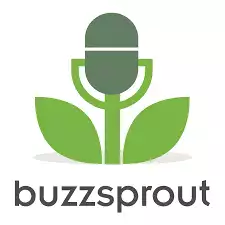


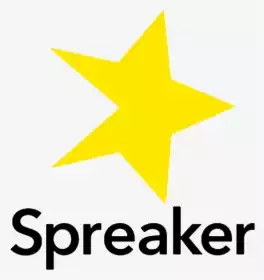



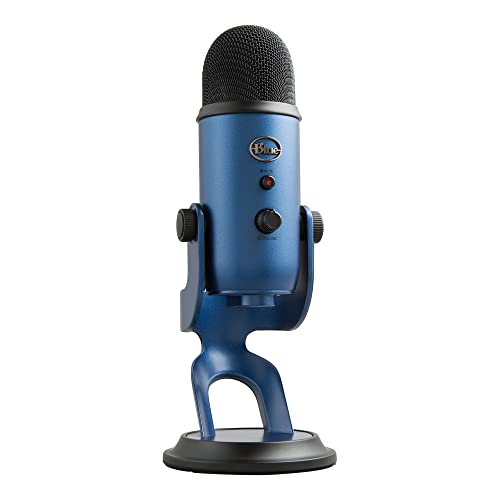

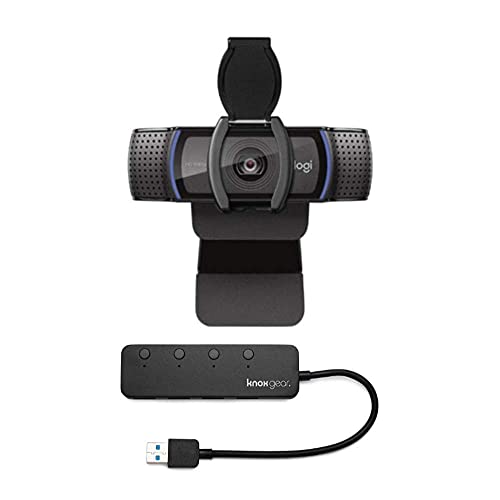


Interested in guesting on podcast
We don’t currently take guests, James.